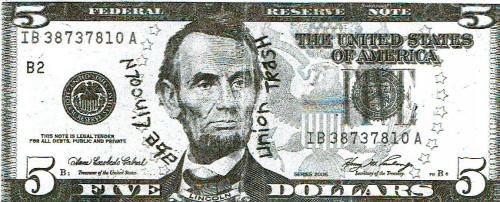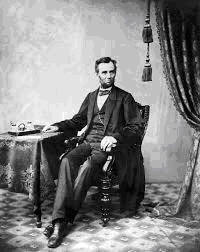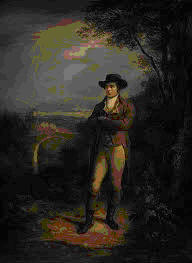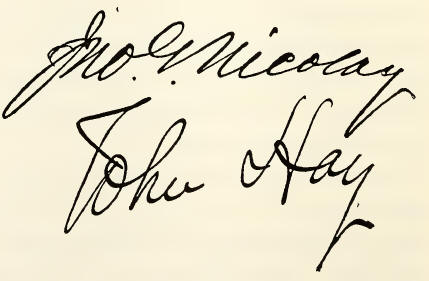|
Edited by Frank R. Shaw, FSA Scot, Greater Atlanta, GA, USA
Email: jurascot@earthlink.net
I wish to thank the following people for
today’s article on two of my favorite heroes, Robert Burns and Abraham
Lincoln. First to my editor and good friend Alastair McIntyre for
introducing me to the article, and then to Alec Ross for the excellent
writing and his permission for the article to grace the pages of Robert
Burns Lives! Also I cannot leave out Fiona Grahame, “girl Friday” at The
Orkney News, for her cooperation in making this possible.
Standing watch over my library of several thousand books on Burns is an
amazingly beautiful bronze bust of our Bard that I had commissioned by
an artist in Houston, Texas modeled after one belonging to our Burns
Club of Atlanta. This sculptor only wanted to be called “Whisper” as his
friends had called him that all of his life due to a medical throat
problem. I learned recently that Whisper had passed away, all too young,
in his early 50s. I mourn for him quite regularly as I sit at my desk
and gaze at his art work just a few feet away.
I carry in my wallet a five-dollar bill featuring President Lincoln that
came into my possession over five years ago. It is marked with filthy
graffiti which will always remind me that we still have a very long way
to go in America before we can claim to be free of racial issues. The
only thing uglier than this filth was the bullet Lincoln’s assassin sent
crashing through his body. God pity the fool who wrote “abe Lincoln
Union TRASH” on that five-dollar bill – he was one of America’s greatest
heroes and, as the song says, “He freed lot of people.”

The $5.00 bill
Alec Ross has written one of the best
articles I have ever read on Burns and Lincoln showing that each of
these men left their legacies of heart and soul for all to share. This
chapter could be featured in any of the greatest Scottish books ever
written. When I thanked Alastair for sending me this jewel, I simply
wrote, “a tremendous article by a gifted writer.” Alec Ross is welcome
to send another Burns article anytime his schedule permits. (FRS:
5.24.17)
Abraham Lincoln & Robert Burns
By Alec Ross
Where does it come from, this love of Burns?
How did I get to a point where Burns seems deeply ingrained in my
psyche, in my heart, in my head, central to my very DNA?
How did it happen that the world got over 40
statues of a long dead Ayrshire poet? How did it happen that his image
overlooks the bowling green at Portpatrick, and the Victoria Embankment
in London? And the Golden Gate Bridge? And the State library of South
Australia? And the early morning joggers in Central Park? And every
library in America? And bank notes? And Russian postage stamps? How did
we get to the stage where a dinner in his honour is watched by millions
on television, live from the Kremlin?
Robert Burns is Scotland’s poet but he
belongs to the world. His story doesn’t have to begin in an old clay
biggin’, during a snowstorm, although that is undoubtedly an important
part of the narrative. So I make no apologies for beginning my story
about Burns not in Ayrshire, but in America.
THE YEAR IS 1865
Dinner has been served, toasts given and
received, cigars lit. A tall and dignified if slightly stooped man is
reciting “To a Mouse”. “Wee sleekit, cow’rin, tim’rous beastie Oh what a
panic’s in thy breastie! Thou need na start awa’ sae hasty wi’ bickerin’
brattle! I’d be laith to run and chase thee wi’ murdering’ pattle”.
The speaker was famous for his rich and
sonorous Midwestern drawl, but the accent tonight was unmistakably
Ayrshire. It’s not clear whether the assembled dignitaries had wanted
Burns with their Brandy. Then again, when the performer is Abraham
Lincoln, who the hell is going to object?
Because this was no ordinary dinner and this
was no ordinary gathering. Lincoln had won the war and achieved a second
term, but now he had to win the peace. To that end, he invited all the
senators and all the governors to the Whitehouse for the weekend to plan
the rebirth of a nation rent asunder by a protracted and bitter civil
war.
To a captivated audience, he continued to
recite. “I’m truly sorry man’s dominion Has broken nature’s social
union, And justifees that I’ll opinion that makes me startle at thee,
Thy pair earth born companion and fellow mortal”.
How those words must have resonated with the
leaders of a shattered America. It was all too much for one old senator,
who turned to Lincoln’s secretary, the softly-spoken John Hay and said:
“What the hell is Abe talking about?”.
“It’s Scotch, sir” replied Hay. “The
President adores the Scotchman who wrote it. He reads him constantly and
recites him every evening. He says he would not be the man he was, would
not have won the war, indeed would not have been President, had it not
been for Robert Burns”.
As Lincoln concluded the poem he turned to
Hay. “Now we have won this great war, I must make good on my promise to
go to Scotland and pay homage to the man without whom everything would
be different. Tomorrow you must book my passage”.
Hay did indeed book the President’s sailing,
but the ship left without him. A few days after the dinner, Lincoln
visited the theatre and a bullet from the gun of John Wilkes Booth meant
that this was a pilgrimage that would never be made. And so ended one of
the truly great political careers, and a life and a politics shaped
utterly and enduringly and fundamentally by the writings of a farmer and
exciseman from Alloway who had been dead for 70 years.
And you read this, and you think – what are
we dealing with here?
THE YEAR IS 1785
A young farmer trudges across an Ayrshire
bog to Auchinleck House to pay homage to his hero, the great biographer
James Boswell. The ploughman has travelled across the winter fields to
pay his compliments, but he is not invited in. James Boswell was a
genius of prose and a king of hospitality, but he was also a snob who
considered a muddy field to be the natural province for a ploughman poet
of the cotter class.
And so it was that the ploughman died at the
age of 37, up a scabby lane in Dumfries, his heart in bits and not a
penny in the house. So: adored by a President but shunned by a
neighbour.
I think that when we talk about Burns, we
talk not of one man but of two. Indeed, there is a paradox at the heart
of Burns that is utterly essential to our understanding of his life and
his work. A man both ordinary and extraordinary. Like Stevenson’s Jekyll
and Hyde, the two sides of Burns fought constantly. The man of thought
fought with the man of reason. The passionate lover fought with the
conscientious scholar. The body fought with the soul. He was both
nationalist and internationalist; Jacobite and Jacobin; lover and
lecher; church wrecker and servant of piety.
Here was a man destined to reach for the sky
with his feet forever in Ayrshire clay. Here was a man who, despite
possessing a once in a generation mind, was bound through class and
through prejudice and through circumstance to walk through the valley of
compromise; a man tortured by the knowledge that his background would
never allow him to become the person he instinctively knew himself to
be.
Indeed it occurs, that the poor ploughboy
scholar who grew up in a succession of failing farms bears little
relation to the dashing literary dandy, feted in the drawing rooms of
polite Edinburgh society. But – they were the same man.Yet far from
being a weakness, this was the paradox that informed his best work and
elevated him to greatness.
Burns is generally remembered as a “Heav’n
taught plowman”, a hard drinker, a womaniser. And although these things
are important, they deflect us from what is less sensational and
fundamentally more appealing about Burns – the indomitable and enduring
humanity of his poetry and his songs. After all it wasn’t a legislator
or a party animal who wrote that great Marseillaise to the human spirit,
but a farmer’s son from Ayrshire with an uncanny connection with
people’s cares and wishes for a better life.
” It’s coming” he said. ” It’s coming yet
for a’ that, that man for man the world over, shall brothers be for a’
that”.
But for all the epic romanticism of Burns’
life, his humanity, his poverty, his passion, his genius, it is the
sheer truthfulness of his poetry that carries us through the day. We
hear it best in the epic “Tam o’Shanter” where Burns shows us how time
is a puzzle of disappearing things.
“But pleasures are like poppies spread, You
seize the flower its bloom is shed, Or like the snow falls in the river,
A minute white then melts forever. Or like the borealis race that flits
ere you can point their place, Or like the rainbow’s lovely form,
evanishing amid the storm”.
And that is the Burns I cannot forget. The
Burns who did so much to make our lives unforgettable. The Burns who
places a social roar in every heart and invites all of us in:”but still
the music of his song rise o’er all elate and strong”.
Its master chords are manhood, freedom,
brotherhood, Its discords but an interlude between the words. And then
to die so young and leave unfinished what he might have achieved! But
better sure is this than wandering up and down, an old man in a country
town infirm and poor.
Robert Burns died in Dumfries in 1796, his
adult body rebelling against years of childhood struggle. He was 37.
Perhaps he knew what was coming. The prescience of to a mouse is
startling. Was this a man foretelling his own end?

Moosie
“But moosie – thou art no’ thy lane in
proving foresight may be vain. The best laid schemes o’ mice – and men
gang aft agley, And leave us nocht but grief and pain for promised joy.
Still – thou art blessed compared wi’ me. The present only toucheth thee
But ach, I backward cast my ee on prospects dreer. And forward. Though I
canny see.I guess an’ fear.”
He was calm, serene even, as he approached
his end. “so” he asked his old friend Maria Riddell. “Have you any
commands for the next world?“.
Seeing his deathly pallor she went to close
the curtains. “Leave it lassie” he said. “The sun may shine tomorrow.
But not for me”.
Rumours had spread that Burns was dying, and
a crowd gathered outside his Dumfries home. A wee boy was heard to shout
“Who will be our poet noo?”.
Our poet then is our poet now. He was, and
he is, Robert Burns. And our poet he will be, as long as there is care
and imagination and warmth and feeling and fellowship upon the earth.
THE YEAR IS 1865
Later that evening, the senators and
congressmen had gone home. As was his custom, Lincoln attended his
diary. “From Shakespeare I learnt the sonnets” he wrote. “From the
bible, the scriptures. But it was from that man I learnt humanity”.
From that man, I learned humanity. And like
all good stories, there’s an epilogue.
Some years after her husband’s death, Mary
Lincoln visited the cottage in Alloway, the farm at Ellisland, the grave
of Highland Mary. In the graveyard at Mauchline, she may not have
recognised the names on the stones. William Fisher, the Holy Willie of
the great religious satire. Nanse Tinnock, his publican. His old
girlfriend, Mary Morrison. Through his poetry, Burns secured their
lasting memory. Through his words, they are not dead but alive in our
imagination and our consciousness. That is his legacy.
But, incredibly, there’s a greater one.
Because we still sing that old Scots song of lasting friendship, Auld
Lang Syne. We join hands with the persons to our left and right. It’s a
curious thing to do when you think about it, but on occasions it feels
like the right thing to do. It’s possible we don’t know the person next
to us. We might guess at their politics, even if we don’t know for sure.
It’s possible we don’t know their religious beliefs, if indeed they hold
any at all. It’s possible we don’t know their stories, their
backgrounds, their life histories.
But here’s the thing. None of that will
matter. Robert Burns gave the world an anthem that celebrates the
enduring capacity of humans to reconnect, despite everything that has
happened between us. In the simple act of holding hands with a stranger,
Burns’ song reiterates a powerful faith in the capacity of people both
to do good and trust others to do good with us. It’s a powerful,
timeless message that flies in the face of modern neo-liberalism – and
it’s why I believe that, while we are still holding Burns Suppers, and
still holding strangers’ hands, then maybe, just maybe, we still have a
chance. And that truly is immortality.
Postscript – Lincoln’s lifelong
fascination with Burns began when he met a guy called Jack Kelso, an
immigrant Scot from Govan, when he was wee. Kelso gave Abe the collected
works of Burns. Never looked back. Kelso, incidentally, was reputed to
have one of the largest private libraries in America. He was previously
a Glasgow schoolteacher.


Abe Lincoln and Robert Burns
Note from Alastair McIntyre
I learnt in June 2019 that John Hay,
mentioned above, had co-authored a 10 volume biography of Abraham
Lincoln. So I thought I'd add it here for you to read if you wish
and here is the author's preface...
Abraham Lincoln, A History
By
John G. Nicolay and John
Hay (1914)
A GENERATION born since Abraham Lincoln died
has already reached manhood and womanhood.
Yet there are millions still living who sympathized with him in his
noble aspirations, who labored with him in his toilsome life, and whose
hearts were saddened by his tragic death. It is the almost unbroken
testimony of his contemporaries that by virtue of certain high traits of
character, in certain momentous lines of purpose and achievement, he was
incomparably the greatest man of his time. The deliberate judgment of
those who knew him has hardened into tradition; for although but
twenty-five years have passed since he fell by the bullet of the
assassin, the tradition is already complete. The voice of hostile
faction is silent, or unheeded; even criticism is gentle and timid. If
history had said its last word, if no more were to be known of him than
is already written, his fame, however lacking in definite outline,
however distorted by fable, would survive undiminished to the latest
generations. The blessings of an enfranchised race would forever hail
him as their liberator; the nation would acknowledge him as the mighty
counselor whose patient courage and wisdom saved the life of the
republic in its darkest hour; and illuminating his proud eminence as an
orator, statesman, and ruler, there would forever shine around his
memory the halo of that tender humanity and Christian charity in which
he walked among his fellow countrymen as their familiar companion and
friend.
It is not, therefore, with any thought of adding materially to his
already accomplished renown that we have written the work which we now
offer to our fellow-citizens. But each age owes to its successors the
truth in regard to its own annals. The young men who have been born
since Sumter was fired on have a right to all their elders know of the
important events they came too late to share in. The life and fame of
Lincoln will not have their legitimate effect of instruction and example
unless the circumstances among which he lived and found his
opportunities are placed in their true light before the men who never
saw him.
To write the life of this great American in such a way as to show his
relations to the times in which he moved, the stupendous issues he
controlled, the remarkable men by whom he was surrounded, has been the
purpose which the authors have diligently pursued for many years. We can
say nothing of the result of our labor; only those who have been
similarly employed can appreciate the sense of inadequate performance
with which we regard what we have accomplished. We claim for our work
that we have devoted to it twenty years of almost unremitting assiduity;
that we have neglected no means in our power to ascertain the truth;
that we have rejected no authentic facts essential to a candid story;
that we have had no theory to establish, no personal grudge to gratify,
no unavowed objects to subserve. We have aimed to write a sufficiently
full and absolutely honest history of a great man and a great time; and
although we take it for
granted that we have made mistakes, that we have fallen into such errors
and inaccuracies as are unavoidable in so large a work, we claim there
is not a line in all these volumes dictated by malice or unfairness.
Our desire to have this work placed under the eyes of the greatest
possible number of readers induced us to accept the generous offer of
“The Century Magazine” to print it first in that periodical. In this way
it received, as we expected, the intelligent criticism of a very large
number of readers, thoroughly informed in regard to the events narrated,
and we have derived the greatest advantage from the suggestions and
corrections which have been elicited during the serial publication,
which began in November, 1886, and closed early in 1890. We beg, here,
to make our sincere acknowledgments to the hundreds of friendly critics
who have furnished us with valuable information.
As “The Century” had already given, during several years, a
considerable portion of its pages to the elucidation and discussion of
the battles and campaigns of the civil war, it was the opinion of its
editor, in which we coincided, that it was not advisable to print in the
magazine the full narrative sketch of the war which we had prepared. We
omitted also a large number of chapters which, although essential to a
history of the time, and directly connected with the life of Mr.
Lincoln, were still episodical in their nature, and were perhaps not
indispensable to a comprehension of the principal events of his
administration. These are all included in the present volumes; they
comprise additional chapters almost equal in extent and fully equal in
interest to those which have already been printed in “The Century.”
Interspersed throughout the work in their proper connection and
sequence, and containing some of the most important of Mr. Lincoln’s
letters, they lend breadth and unity to the historical drama.
We trust it will not be regarded as presumptuous if we say a word in
relation to the facilities we have enjoyed and the methods we have used
in the preparation of this work. We knew Mr. Lincoln intimately before
his election to the Presidency. We came from Illinois to Washington with
him, and remained at his side and in his service—separately or
together—until the day of his death. We were the daily and nightly
witnesses of the incidents, the anxieties, the fears, and the hopes
which pervaded the Executive Mansion and the National Capital. The
President’s correspondence, both official and private, passed through
our hands; he gave us his full confidence. We had personal acquaintance
and daily official intercourse with Cabinet Officers, Members of
Congress, Governors, and Military and Naval Officers of all grades,
whose affairs brought them to the White House. It was during these years
of the war that we formed the design of writing this history and began
to prepare for it. President Lincoln gave it his sanction and promised
his cordial cooperation. After several years’ residence in Europe, we
returned to this country and began the execution of our long-cherished
plan. Mr. Robert T. Lincoln gave into our keeping all the official and
private papers and manuscripts in his possession, to which we have added
all the material we could acquire by industry or by purchase. It is with
the advantage, therefore, of a wide personal acquaintance with ah the
leading participants of the war, and of perfect familiarity with the
manuscript material, and also with the assistance of the vast bulk of
printed records and treatises which have accumulated since 1865, that we
have prosecuted this work to its close.
If we gained nothing else by our long association with Mr. Lincoln we
hope at least that we acquired from him the habit of judging men and
events with candor and impartiality. The material placed in our hands
was unexampled in value and fullness; we have felt the obligation of
using it with perfect fairness. We have striven to be equally just to
friends and to adversaries; where the facts favor our enemies we have
recorded them ungrudgingly; where they bear severely upon statesmen and
generals whom we have loved and honored we have not scrupled to set them
forth, at the risk of being accused of coldness and ingratitude to those
with whom we have lived on terms of intimate friendship. The
recollection of these friendships will always be to us a source of pride
and joy; but in this book we have known no allegiance but to the truth.
We have in no case relied upon our own memory of the events narrated,
though they may have passed under our own eyes; we have seen too often
the danger of such a reliance in the reminiscences of others. We have
trusted only our diaries and memoranda of the moment,- and in the
documents and reports we have cited we have used incessant care to
secure authenticity. So far as possible, every story has been traced to
its source, and every document read in the official record or the
original manuscript.
We are aware of the prejudice which exists against a book written by two
persons, but we feel that in our case the disadvantages of collaboration
are reduced to the minimum. Our experiences, our observations, our
material, have been for twenty years not merely homogeneous—they have
been identical. Our plans were made with thorough concert; our studies
of the subject were carried on together; we were able to work
simultaneously without danger of repetition or conflict. The
apportionment of our separate tasks has been dictated purely by
convenience; the division of topics between us has been sometimes for
long periods, sometimes almost for alternate chapters. Each has written
an equal portion of the work; while consultation and joint revision have
been continuous, the text of each remains substantially unaltered. It is
in the fullest sense, and in every part, a joint work. We each assume
responsibility, not only for the whole, but for all the details, and
whatever credit or blame the public may award our labors is equally due
to both.
We commend the result of so many years of research and diligence to all
our countrymen, North and South, in the hope that it may do something to
secure a truthful history of the great struggle which displayed on both
sides the highest qualities of American manhood, and may contribute in
some measure to the growth and maintenance throughout all our borders of
that spirit of freedom and nationality for which Abraham Lincoln lived
and died.

Volume 1 |
Volume 2 |
Volume 3 }
Volume 4 |
Volume 5
Volume 6 |
Volume 7 |
Volume 8 }
Volume 9 }
Volume 10
Lincoln in Scotland
Pioneering |

